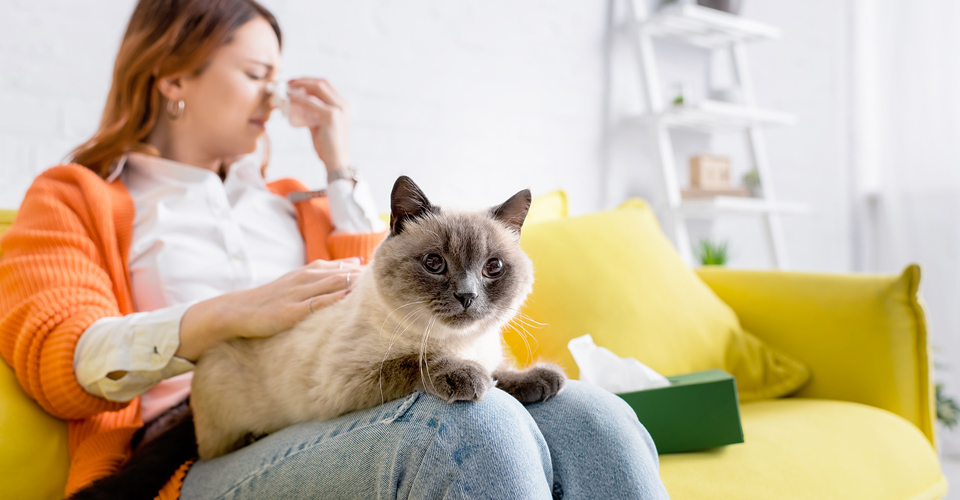Allergies to furry animals, such as cats and dogs, are rather common.
They affect about 20% of the world’s population, according to the Asthma and Allergy Foundation of America.
Even rabbits, guinea pigs, hamsters, ferrets, and horses can induce allergy symptoms.
Feather-more, birds such as parrots and parakeets can also cause allergy symptoms in people.
The good news for cat lovers is that there’s a cure for cat allergies.
But if all the stuff trapped in your fur baby’s coat leaves your guest (or worst of all) you teary-eyed and wheezing – keep reading.
Dander danger.
Pet dander can be described as flakes of skin in an animal's fur or hair. It extends to urine residue and traces of saliva. Pet dander is what leaves your guests feeling not so dandy by activating the chemicals our bodies release for an allergic reaction.
What are common pet allergy symptoms?
- Swelling and itching of the eyes and nose,
- Stuffy nose,
- Sneezing,
- Runny nose,
- Postnasal drip,
- Redness of the eyes,
- Coughing,
- Hives,
- Other: sleep disruption, fatigue, itchiness of the roof of mouth and throat, irritability.
How to reduce your guest’s exposure to pet allergens.
First and foremost, you want to limit their exposure to by ensuring there is minimal dander, urine, and licked fur in the corners of your house where they are most likely to spend their time. Here are 9 ways to reduce your guest’s exposure to pet allergens:
- Keep your pet out of bedrooms or places your guests will sleep (if they’re sleeping over).
- Keep pets off fabric furniture.
- If you’ve been playing with your pet, shower and change clothes before your guest arrives.
- Wash your hands and face after petting or touching the pet, its cage, or its bedding.
- Remove dust on hard surfaces with a damp cloth to keep the pet dander from going back into the air.
- Wipe down walls, cabinets, and floorboards with a damp cloth.
- Vacuum fabric furniture and carpets weekly. Use a vacuum cleaner with a high-efficiency particulate absorbing filter.
- Wash or vacuum fabric curtains before your visitor arrives or clean blinds with a damp cloth.
- Brush your pet outside (somewhere your guests are not likely to go) to remove fur and wipe your pet down with pet-friendly wipes to remove pollen and urine.
Over-the-counter allergy medicines to keep on your counter.
Options include antihistamines and corticosteroids:
Nasal rinse: A saline (saltwater) nose rinse can help cut down mucus and rinse pollen out of your nose.
Nasal sprays: Corticosteroid and Antihistamine nasal sprays can be effective in cases involving swelling and inflammation.
Eye drops: Allergy eye drops can be very helpful in managing eye allergy symptoms. They can relieve a burning sensation, itchiness, redness, increased tearing, and swelling.
Antihistamines: Your guest can pop these as pills, gulp them down as a liquid, squirt them up their nasal passages to relieve sneezing and itchy eyes and nose. Look for ones that won’t make your guest sleepy.
Decongestants: You can get these as pills, liquids, nasal sprays, or drops. You should always check if your guests don’t have high blood pressure, glaucoma, thyroid disease, or trouble urinating, before proffering decongestants as an allergy vanquisher.
Leukotriene modifiers: No, this is not the serum that turned Dr Osborne into a green goblin (sure sounds like it, though). These modifiers can help by blocking the chemicals our bodies release for an allergic reaction. Or try Cromolyn sodium. It works in a similar way.
Guests allergic your dog?
Your pet's sex may be to blame, studies suggest. This is according to a 2019 study reported on by Daily Paws. You can read all about it here.
Perhaps your pet also suffers from allergies? Here are some tips to keep your pet’s allergies on the run.
Reference: Chan SK and Leung DYM. Dog and Cat Allergies: Current State of Diagnostic Approaches and Challenges. Allergy Asthma Immunol Res 2018 March;10 (2) 97-105.
Disclaimer: This blog is intended for informational purposes only and should in no way be regarded as a substitute for professional veterinary advice.



